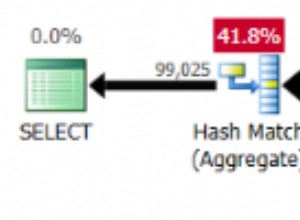A partire da PostgreSQL 9.4, puoi usare il ? operatore:
select info->>'name' from rabbits where (info->'food')::jsonb ? 'carrots';
Puoi persino indicizzare il ? interrogare il "food" se passi a jsonb digita invece:
alter table rabbits alter info type jsonb using info::jsonb;
create index on rabbits using gin ((info->'food'));
select info->>'name' from rabbits where info->'food' ? 'carrots';
Ovviamente, probabilmente non hai tempo per questo come allevatore di conigli a tempo pieno.
Aggiornamento: Ecco una dimostrazione dei miglioramenti delle prestazioni su un tavolo di 1.000.000 di conigli in cui a ogni coniglio piacciono due cibi e il 10% di loro come le carote:
d=# -- Postgres 9.3 solution
d=# explain analyze select info->>'name' from rabbits where exists (
d(# select 1 from json_array_elements(info->'food') as food
d(# where food::text = '"carrots"'
d(# );
Execution time: 3084.927 ms
d=# -- Postgres 9.4+ solution
d=# explain analyze select info->'name' from rabbits where (info->'food')::jsonb ? 'carrots';
Execution time: 1255.501 ms
d=# alter table rabbits alter info type jsonb using info::jsonb;
d=# explain analyze select info->'name' from rabbits where info->'food' ? 'carrots';
Execution time: 465.919 ms
d=# create index on rabbits using gin ((info->'food'));
d=# explain analyze select info->'name' from rabbits where info->'food' ? 'carrots';
Execution time: 256.478 ms




